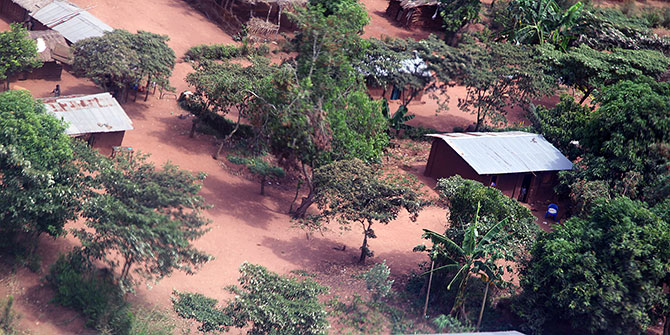Omolade Adunbi discusses the books that inspire him and that have had a lasting influence on his research.
When I started graduate school at Yale in the early 2000s, Nigeria, my home country, had just transitioned from many years of military dictatorship to a democracy. I thought I would begin my graduate research by looking at the interesting but complex politics of truth telling and reconciliation commissions. Just a few years before, the apartheid regime in South Africa had fallen and been replaced with a multi-party democracy. The Nelson Mandela regime in 1994, taking a cue from Latin American countries such as Chile, Argentina and El-Salvador, immediately announced their desire to establish a Truth and Reconciliation Commission, TRC, soon after Mandela took power, that would address past atrocities committed by the apartheid regime. With this prominent example, it was not surprising when, on being elected the president of a democratic Nigeria, Olusegun Obasanjo also decided to set up the Nigerian Human Rights Violations Investigation Commission. These two important regime changes made truth commissions a major pre-occupation of many academics that are Africanists.

The changes also made it an exciting time to begin graduate school. I was fascinated with how academic literature, especially in political science, law, and anthropology, discussed political transitions and the politics of truth telling. In my preliminary research on truth commissions, I observed that the terms of reference of the commission in Nigeria were exactly the same as that of South Africa. I also noticed that over 80% of petitions received by the Nigerian Human Rights Violations Investigation Commission emanated from the Niger Delta where Nigeria’s oil wealth is located. My investigation into how a place with such immense oil wealth could be home to some of the poorest citizens in Nigeria forever changed my perception about political transitions in countries rich in natural resources.
Three books had a large influence on my understanding of the complex nature of global oil politics and were instrumental in my development as a scholar: Fernando Coronil’s The Magical State: Nature, Money and Modernity in Venezuela; Andrew Apter’s The Pan African Nation: Oil and the Spectacle of Culture in Nigeria ; and Susannah Sawyer’s Crude Chronicles: Indigenous Politics, Multinational Oil and Neoliberalism in Ecuador. Coronil’s book on the anthropology of oil changed my initial interest in oil into a research project. Prior to the publication of Coronil’s book in 1997, the study of oil politics had been dominated by disciplines such as geography, political science and economics. Much of the literature in these disciplines seemed to be competing for space in the reshaping and rephrasing of the current dominant theory—resource curse. As many political theorists have argued, resource curse occurs when countries endowed with natural resources develop a mono-economy that only relies on one of these resources. One reason for this might be the abundant wealth that the one resource—oil, in the case of Nigeria—produces. With such a singular focus, other important sectors of the economy such as agriculture and manufacturing are often neglected. Coronil’s book provided a new insight into how we might study the complex oil politics beyond the then popular resource curse paradigm.
It was not until 2004 that another major work by an anthropologist—Susannah Sawyer’s book—followed Coronil’s lead in the study of oil extraction. Sawyer shaped the discussion on how non-governmental organizations’ intervention in the environmental movement can help shape the debate on how multinational oil corporations engage with communities where oil is extracted. In her book, she calls attention to the important place of NGOs in shaping discourses about indigenous populations engagement with the extractive industry. She also aptly discusses the various strategies put in place by indigenous movements in countering the efforts of multinational corporations in alliance with the state to reduce indigenous struggles for greater benefits of their land and resources, an issue Apter takes up in his book.
Apter’s focus on Nigeria, my research area, was invaluable to molding my anthropological approach to the politics of oil in Nigeria’s Niger Delta. He introduced the notion that oil wealth can shape a particular culture that redefines the state and produces new meaning of blackness and what it means to be an African. In addition, he used his book to show how oil wealth “underwrote the veracity of a range of discourses, from the technical and scientific to the national and even racial” because it shaped the face of distribution by the Nigerian state. He returns to Sawyer’s discussion of indigenous movements in his analysis of the Ken Saro Wiwa led Movement for the Survival of Ogoni People (MOSOP) and their struggles to reclaim their land and what they consider to be their oil resources. The struggle eventually led to Wiwa’s and eight other Ogoni leaders’ execution by the Nigerian military dictator, General Sani Abacha, in November 1995.
The work I began after my encounter with Coronil was enriched by Apter’s focus on the cultural production of what was imagined as the most powerful black nation on earth, Nigeria, and Sawyer’s attention to the important place of NGOs in shaping discourses about indigenous populations engagement with multinational corporations in alliance with the state. My own work shifted attention to the politics of claim-making in resource rich enclaves such as the Niger Delta of Nigeria. I particularly illuminate how such claim-making politics produces processes that are connected to notions of ancestral wealth and ownership of resources. Communities rich in natural resources elucidate claim of ancestral wealth with assistance from local and transnational Non Governmental Organizations in an attempt to reclaim their land and resources. As I show in my work, this form of politics does not only complicate oil corporations’ relationship with the state and communities rich in natural resources, but at the same time produces what I call complex actors—insurgents, activists, oil corporations, the state and transnational NGOs.
This article was first published on the Books Combined blog.
Omolade Adunbi is a political anthropologist and an Assistant Professor at the Department of Afroamerican and African Studies (DAAS) at the University of Michigan. His next book, Oil Wealth and Insurgency in Nigeria, is published in July 2015.
The views expressed in this post are those of the author and in no way reflect those of the Africa at LSE blog or the London School of Economics and Political Science.





